Malaysia projects operating normally, says Country Garden as Forest City gets ‘special zone’ status
Sign up now: Get insights on the biggest stories in Malaysia
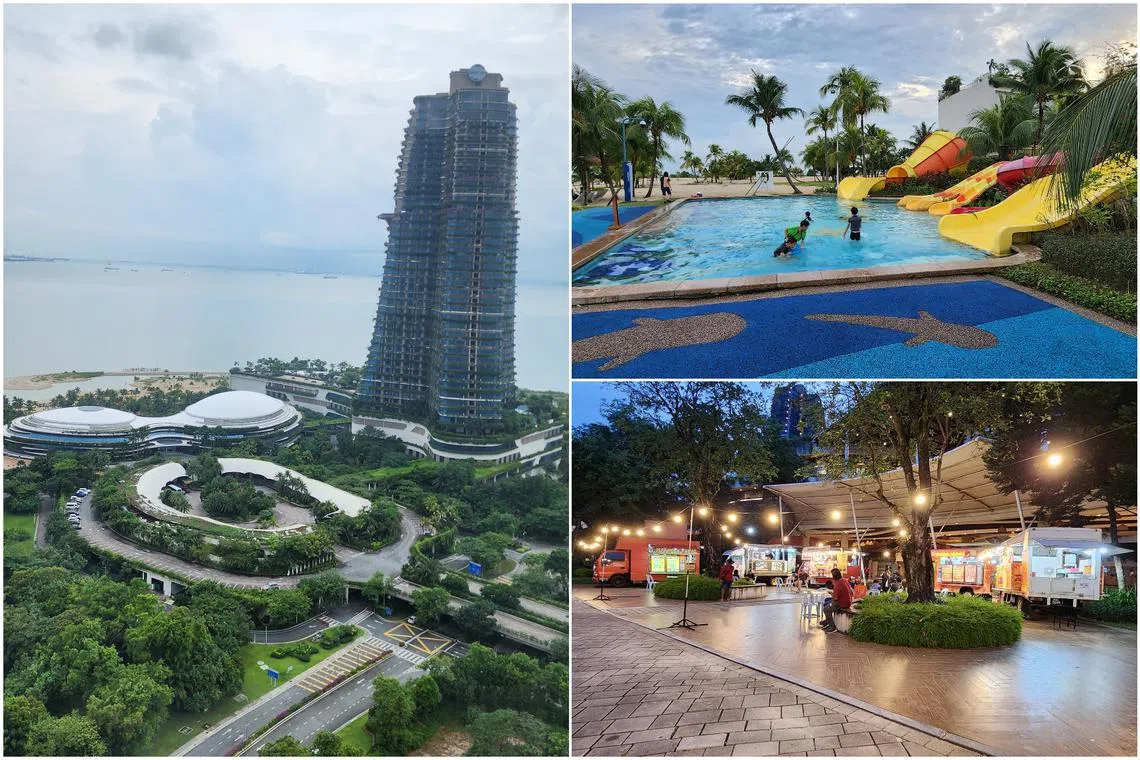
The Malaysian government has designated the Forest City project as “a special financial zone” to spur the economy in southern Johor.
ST PHOTO: HAZLIN HASSAN
ISKANDAR PUTERI, Johor – China’s biggest property developer Country Garden on Monday said its five projects in Malaysia are operating normally and with strong sales performance, amid concerns that the group is facing a debt crisis.
Its projects in Malaysia include the mammoth US$100 billion (S$136 billion) Forest City in Johor, which received a boost last week when Prime Minister Anwar Ibrahim said the government has designated the project as “a special financial zone”
“To date, the overall operation of the region is safe and stable,” the developer’s Malaysia and Singapore unit said in a statement. “Our company’s projects in Malaysia are operating normally and the sales performance is strong.”
The statement added: “Various debt management measures are considered to actively resolve the pressure of periodic liquidity, to ensure the company’s long-term future development.”
Country Garden Holdings faced total liabilities of US$194 billion at the end of 2022, with worries about the outlook of Forest City and its other Malaysian projects.
Earlier in August, Country Garden missed two coupon payments totalling US$22.5 million.
In Johor, its projects are Forest City, Country Garden Danga Bay and Central Park. The company also has projects in Lake City@KL North and Diamond City in the Klang Valley.
Datuk Seri Anwar, on a visit to Johor last Friday, said incentives offered for the Forest City special zone would include multiple entry visas, fast-track entry for those working in Singapore and a flat income tax rate of 15 per cent for knowledge workers.
“I am confident this will attract many companies which are experiencing high operating costs in Singapore,” Mr Anwar said, adding that housing and education costs are also high in the Republic.
Forest City is Country Garden’s largest overseas project, with a plan to house 700,000 people living on four reclaimed islands by 2035. Swish condominiums and landed homes would be complemented by malls, office towers and industrial parks.
Country Garden has a 60 per cent stake in Forest City’s master developer, Country Garden Pacificview. The remaining 40 per cent is held by Esplanade Danga 88, a private Malaysian company owned by a Johor government agency and the state’s Sultan Ibrahim Iskandar.
Under the original plan for Forest City, the four islands that face Singapore’s Tuas area would total 2,000ha – nearly three times the size of Ang Mo Kio. So far, 1,400ha have been reclaimed, with half of this having been developed on one artificial island, making up about 15 per cent of the project.
Some 30 condominium blocks have been completed, along with several dozen landed homes.
Nearly seven years after the launch of the project, many of the residential blocks appeared to have few residents, The Straits Times found on a recent visit. A major reason could be that out of the 26,000 units handed over to buyers, 70 per cent of them were from China.
During ST’s visit to Forest City, two home owners – Ms Feng Ying Zhao and Ms Joyce Shi from China – happily watched their children play on its man-made beach overlooking Singapore.

Children at Forest City’s man-made beach.
ST PHOTO: HAZLIN HASSAN

Children playing at a waterpark in Forest City.
ST PHOTO: HAZLIN HASSAN
Rows and rows of tall condominium blocks towered over them.
Ms Shi, who is from Suzhou, said of Country Garden’s financial woes: “I am not worried. It is big news in China, but it doesn’t affect me.”
She owns a two-bedroom unit, as does Ms Feng, who hails from Gansu.
“I don’t agree that Forest City is a ghost city. It is a paradise city,” added Ms Shi, a 36-year-old business owner, referring to media reports that described it as a “ghost town”. “I can feel the wind and relax here.”
She pays around 7,000 yuan (S$1,300) a year in maintenance fees for her unit.
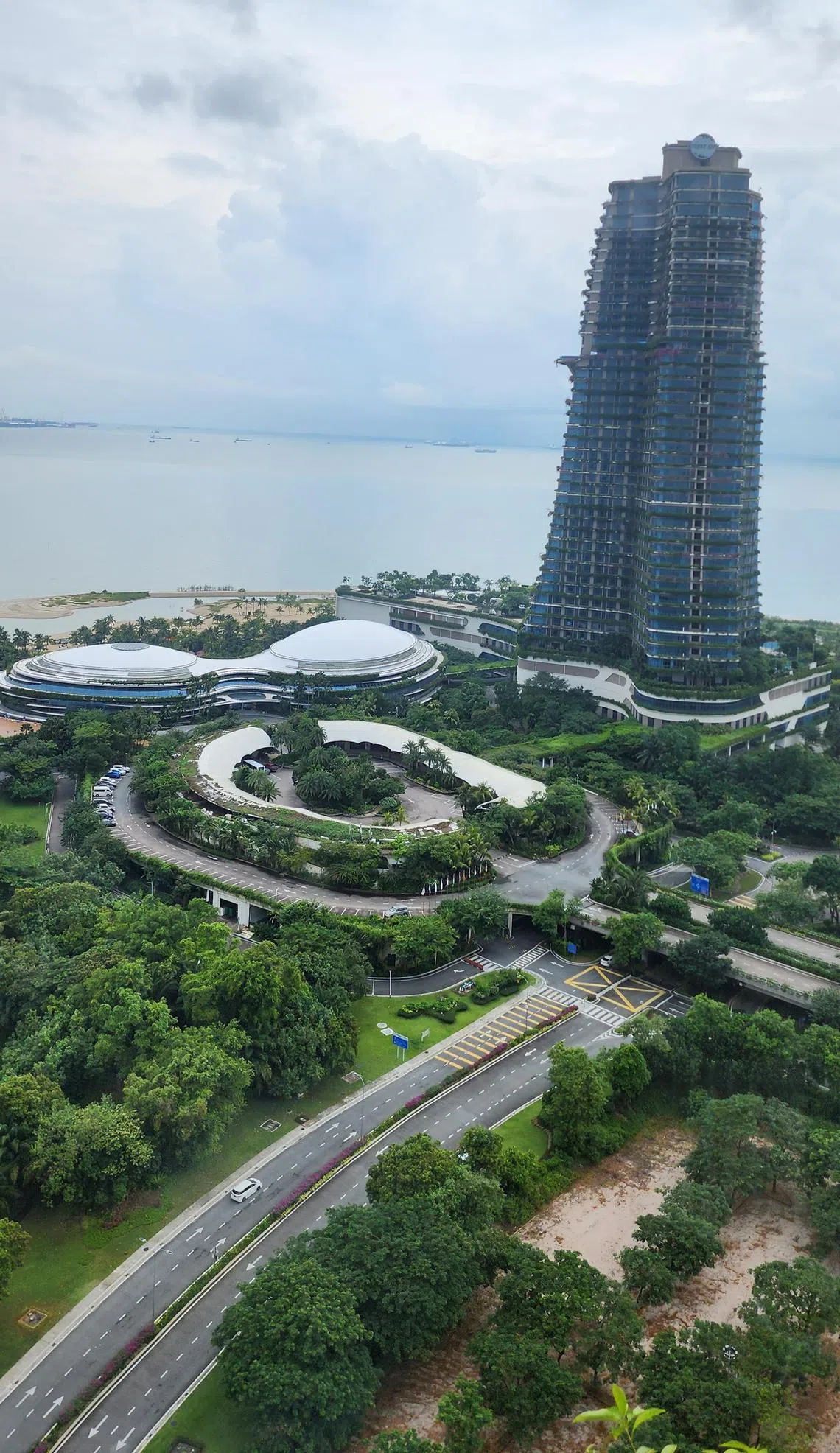
Forest City is Country Garden’s largest overseas project.
ST PHOTO: HAZLIN HASSAN
A couple from China, who wanted to be known only as Crackers and Judy due to privacy reasons, said they believe Country Garden’s financial troubles will not impact Forest City because they were “different companies”.
The couple, who have joined the Malaysia My Second Home expatriate retirement programme, own three apartments in Forest City, occupying one unit and renting out the other two for short stays.
“We are aware of the location being far from the city area (of Johor Bahru). However, the living environment here is very good. We are very satisfied with the residential development here. If we weren’t happy with the place, we would have left a long time ago,” Ms Judy told ST.
Mr Samuel Tan, executive director of KGV International Property Consultants in Johor, told ST that news about Country Garden’s debt crisis had raised concerns about the company’s projects abroad.
“There is also a fear of cross effects on the other projects. Even though some of the projects are by different legal entities, the perception was Country Garden China is still a shareholder and may possibly default too.”
However, as the earlier batches of the developments have largely been completed, the impact of the debt crisis should be confined to the “fear factor” and negative perceptions, said KGV International Property Consultants’ head of research Tan Wee Tiam.
On the evening of ST’s visit to the project, only a few units in each block had lights on.
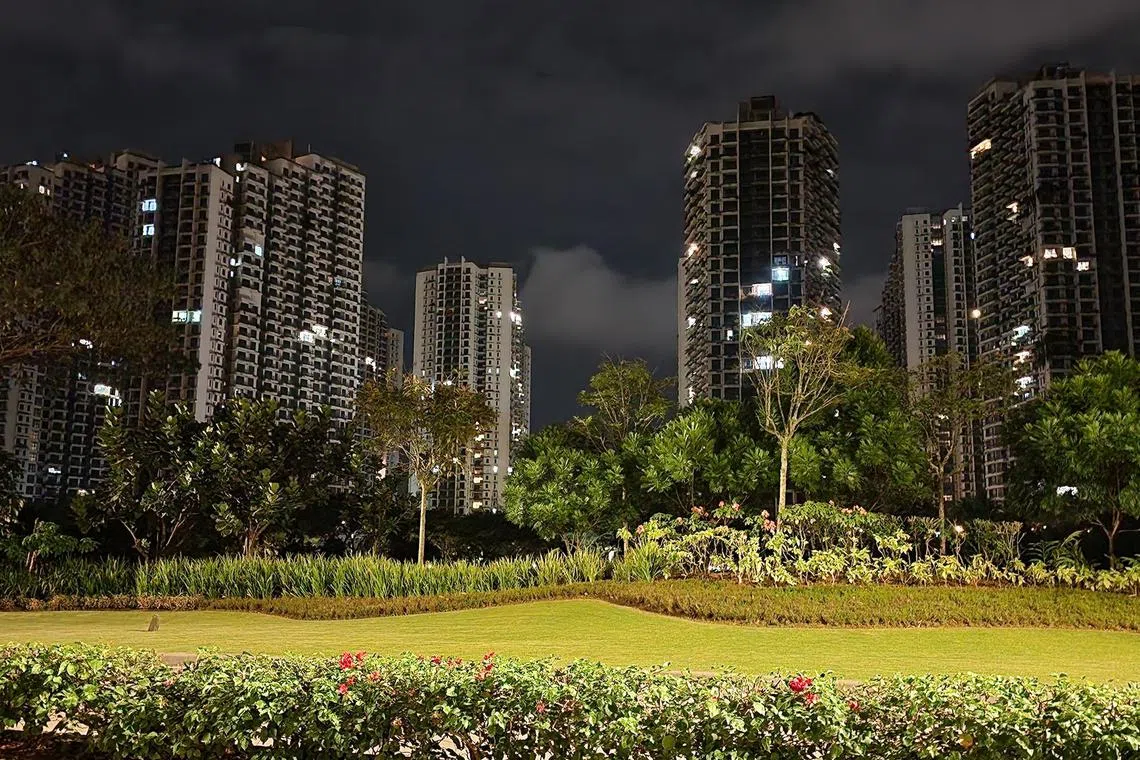
On the evening of ST’s visit to the project, only a few units in each block had lights on.
ST PHOTO: HAZLIN HASSAN
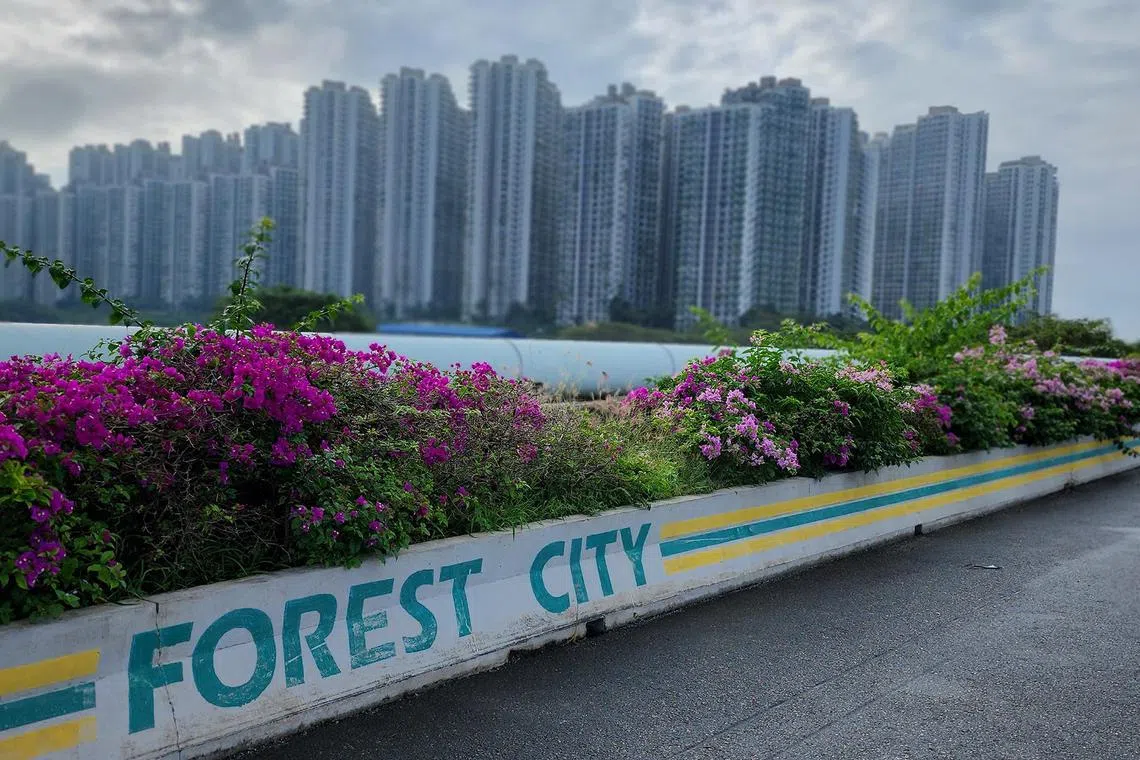
Country Garden has a 60 per cent stake in Forest City’s master developer, Country Garden Pacificview.
ST PHOTO: HAZLIN HASSAN
Property agents say that some units have been rented out, including to Malaysians working in Singapore and to Singaporeans. Other units are available for staycations.
Country Garden had said in an earlier statement that with the reopening of borders worldwide after the Covid-19 pandemic, more residents have moved into Forest City, with some 9,000 owners and long-term tenants currently living there.
“Since April this year, more than 2,250 Forest City owners from various countries have come back,” the company said.
Along the artificial beach, Ms Rina Samil, 45, who has been selling fried fish crackers there since April, said business has been good.
“A lot of Singaporeans have moved back in recently. On a good day, we can make sales of about RM2,000 (S$580) to RM2,800 a day,” she said.

Ms Rina Samil (left) and her business partner Indah Zulkifli at their stall selling fried fish crackers in Forest City.
ST PHOTO: HAZLIN HASSAN
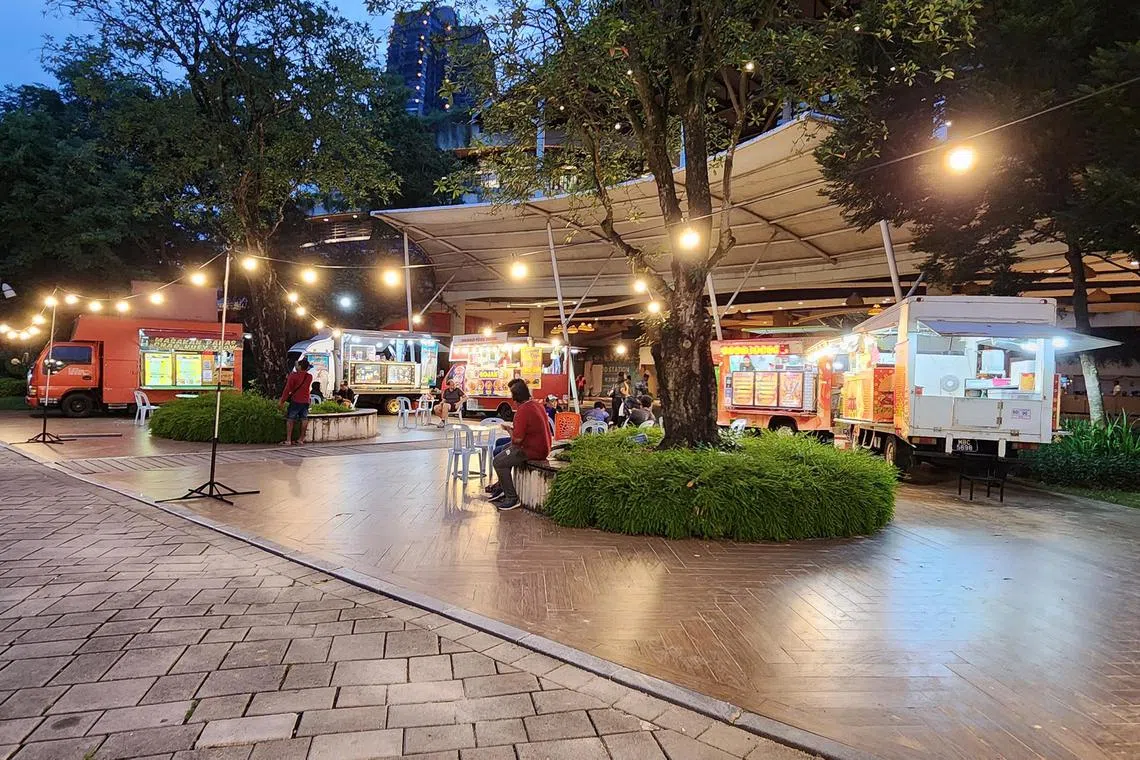
Food trucks in Forest City.
ST PHOTO: HAZLIN HASSAN
Dr Gregg Maloberti, head of school at Shattuck-St Mary’s Forest City International School, which is located within Forest City but operates independently of the project, told ST: “Once (the lockdown) was lifted, and China resumed easy travel between Malaysia and China, we are not seeing a ghost town. That has always been exaggerated.”
He said there are nearly 200 students at the school, which has a capacity of around 900.
“We hope to reach 300 within a year, and continue to grow by 100 to 150 students per year. We are seeing steady interest from China and South Korea,” he said.
Some 33 per cent of students are from China, 30 per cent from South Korea, and 5 per cent from Japan and the United States, with other nationalities making up the rest.



